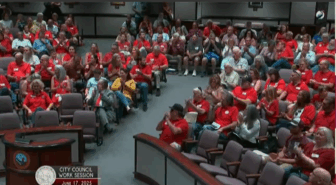What an incredible few weeks it’s been in Virginia’s General Assembly! I’m pleased to report we’ve been successful on many of our priority bills this session. Wednesday is officially “crossover” which means that each chamber can only hear bills that survived in the other chamber. Think of it as the political equivalent of “halftime”. So with that, let’s recap the first half of session to date.
Hybrid Tax
Thanks to many of you who stayed involved during this campaign, the hybrid tax repeal has passed both chambers of the General Assembly. In its final form, Del. Rust’s HB 975 passed the House 89-9 and Sen. Newman’s SB 127 passed the Senate 35-3. These bills repeals the arbitrary and unfair $64 tax on hybrid vehicles and also offers a refund to those who paid the registration fee for years after July 1, 2014.
As you may recall, Del. Surovell and Sen. Ebbin started the hybrid tax repeal campaign and was the first to introduce repeal legislation in their respective houses. Both of their bills were eventually rolled into the two bills above. Many thanks to all our legislators who took a leadership role by repealing this tax on climate solutions in Virginia!
Machinery and Tools Tax
Virginia currently has inconsistent and punishing taxes on solar equipment. Thus, we put in bills to eliminate real and personal property taxes for solar equipment. Solar equipment is deemed manufacturing equipment and is subject to machinery and tools taxes. Our bills redefined solar equipment as “pollution abatement equipment”, thus eliminating these taxes and providing the same tax relief currently enjoyed by the landfill gas industry.
HB 1239 patroned by Del. Hugo passed the House 93-5 and SB 418 patroned by Sen. Hanger passed the Senate 40-0! Sen. Wagner had an identical bill and rolled his bill into Sen. Hanger’s. This is a MAJOR win for clean businesses in Virginia and will help spur the development of clean energy throughout the commonwealth.
RPS
Yes, we’re still picking away at our terribly flawed voluntary renewable goals, aka the RPS. Del. Lopez’s HB 822 and Sen. McEachin’s SB 498 will establish a 5 year banking limit of Renewable Energy Certificates, or RECs. Currently, utilities buy up a load of cheap RECs, many of which are from out state, and apply them to satisfy the RPS goals years down the road. This fix will ensure continued growth of renewables in future years. This bill passed the House 95-2 and passed the Senate unanimously!
The Bad Bills
There were several bad bills floating around the assembly. Thanks to many of you, we were able to kill many of them or make them better to the point where the bill is at least palatable.
Del. Chafin’s HB 1261 and Sen. Carrico’s SB 615 sought to preempt the impending greenhouse gas EPA regulations by charging the state to comply with these regulations in the least restrictive way possible, while keeping in mind all of the “costs” to comply with these regulations. CCAN joined with other organizations to demand amendments to this bill. In the end, the bill eliminates the “least restrictive” language. The resulting bill asks DMME to study both the costs AND benefits of these regulations on Virginia.
Delegate Poindexter introduced HB 915 that would’ve mandated the allowance of fracking on any state land that also receives an oil and gas drilling permit. Thankfully, this bill died in committee.
Delegate Dickie Bell introduced HB 207 that would’ve required schools to instruct teachers to teach alternative theories to “controversial scientific theories” like evolution and climate change. This bill is technically still alive but is struggling in the committee process. We’ll continue to monitor.
Other Bills We Worked On
Delegate Stolle and Sen. Locke introduced HJ 16/SJ 3 which establishes a joint committee to study “recurrent flooding”. As we all know, climate change is accelerating sea-level rise in Hampton Roads. However, the General Assembly is hesitant to use any of those terms and instead uses “recurrent flooding”. This committee will study adaptation measures to deal with flooding. The bills passed both chambers unanimously.
Lastly, Sen. Favola’s SB 671 would’ve mandated that a utility report lifecycle water withdrawals and consumption for fuels used at power plants in Virginia. Unfortunately, this bill did not survive committee. As we all know, one of the terrible consequences of climate change is drought, which has caused water shortages all across the globe. Power plants withdraw more water than any other sector in America. The Senate committee did agree to request that this bill and the broader issue of water scarcity be studied by the State Water Commission. CCAN will remain heavily involved with this cause.
That’s all for now. Enjoy the second half!





